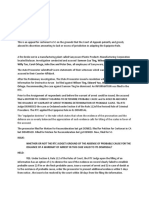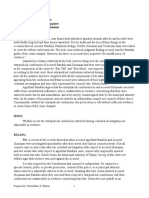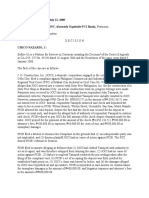People vs. Bravo
People vs. Bravo
Uploaded by
mwaikeCopyright:
Available Formats
People vs. Bravo
People vs. Bravo
Uploaded by
mwaikeOriginal Description:
Copyright
Available Formats
Share this document
Did you find this document useful?
Is this content inappropriate?
Copyright:
Available Formats
People vs. Bravo
People vs. Bravo
Uploaded by
mwaikeCopyright:
Available Formats
PEOPLE V.
BRAVO
FACTS:
The decomposing body of nine year old girl Juanita Antolin (Len-len) was found in a
vacant lot -- naked, shirtless and skirt pulled up, her panty stuffed in her mouth. Her body
was found about 700 meters from her house. The scalp on the left side of her head was
detached exposing a fracture on the left temporal lobe of her skull. Vaginal examination
showed fresh laceration easily accepts two fingers. The cause of death was cerebral
hemorrhage.
An Information for rape with homicide was filed against herein accused-appellant. He
was arraigned and pleaded not guilty.
Evelyn, an eight year old second grader and neighbor and cousin of the victim
testified that she was with the deceased the night before she disappeared. In court, Evelyn
positively identified the appellant as the person last seen with Len-len before she was found
dead. The owner of the house where Len-len and Evelyn watched television, Gracia
Monahan, corroborated Evelyn's testimony.
The Chief of the Intelligence Section of the Santiago Police Department, Alexander
Mico, testified in court that at the police station the appellant admitted he was with the girl
and he carried her on his shoulder but he was so drunk that night that he does not
remember what he did to her. On cross-examination Mico admitted that he did not inform
the appellant of his constitutional rights to remain silent, to counsel and of his right against
self-incrimination before the appellant made the said admission because according to Mico
he was only informally interviewing the accused when he made the admission and that
custodial interrogation proper was conducted by the assigned investigator.
HELD:
We resolve to acquit Benito Bravo. Section 12 of Article III of the 1987 Constitution
embodies the mandatory protection afforded a person under investigation for the
commission of a crime and the correlative duty of the State and its agencies to enforce such
mandate. The mantle of protection under this constitutional provision covers the period from
the time a person is taken into custody for investigation of his possible participation in the
commission of a crime or from the time he is singled out as a suspect in the commission of a
crime although not yet in custody. Law enforcement agencies are required to effectively
communicate the rights of a person under investigation and to insure that it is fully
understood. Any information or admission given by a person while in custody which may
appear harmless or innocuous at the time without the competent assistance of an
independent counsel should be struck down as inadmissible. It has been held, however, that
an admission made to news reporters or to a confidant of the accused is not covered by the
exclusionary rule.
The accused was under arrest for the rape and killing of Juanita Antolin and any
statement allegedly made by him pertaining to his possible complicity in the crime without
prior notification of his constitutional rights is inadmissible in evidence. The policeman's
apparent attempt to circumvent the rule by insisting that the admission was made during an
"informal talk" prior to custodial investigation proper is not tenable. The appellant was not
invited to the police station as part of a general inquiry for any possible lead to the
perpetrators of the crime under investigation.
You might also like
- Kapunan Vs CADocument4 pagesKapunan Vs CAGlenda Mae GemalNo ratings yet
- Villaruel JR Vs FernandoDocument2 pagesVillaruel JR Vs Fernandor_respicioNo ratings yet
- 17 People Vs NG PekDocument1 page17 People Vs NG PekHiroshi CarlosNo ratings yet
- David v. Arroyo (489 SCRA 160)Document2 pagesDavid v. Arroyo (489 SCRA 160)Void Less100% (2)
- Reyes V NHA Case DigestDocument1 pageReyes V NHA Case DigestMichelle Deceda100% (3)
- In Re - Atty. Felizardo M. de GuzmanDocument1 pageIn Re - Atty. Felizardo M. de Guzmanmwaike100% (1)
- In Re - Atty. Felizardo M. de GuzmanDocument1 pageIn Re - Atty. Felizardo M. de Guzmanmwaike100% (1)
- Gamboa Vs CruzDocument2 pagesGamboa Vs Cruzpaul_jurado18100% (1)
- Clemons Vs NoltingDocument1 pageClemons Vs NoltingRey P. Obnimaga, Jr.No ratings yet
- People Vs ErnasDocument3 pagesPeople Vs ErnasPia SottoNo ratings yet
- Facts:: Kwong Sing vs. City of Manila G.R. No. L-15972 October 11, 1920Document3 pagesFacts:: Kwong Sing vs. City of Manila G.R. No. L-15972 October 11, 1920Aj GuanzonNo ratings yet
- NPC V Dela CruzDocument2 pagesNPC V Dela CruzJasmine Buen100% (1)
- People v. BaloloyDocument1 pagePeople v. BaloloySei KawamotoNo ratings yet
- People V Quitlong DigestDocument2 pagesPeople V Quitlong DigestJay SosaNo ratings yet
- Aclaracion Vs GatmaitanDocument4 pagesAclaracion Vs GatmaitanJosephine Berces100% (2)
- Feeder International Line VDocument5 pagesFeeder International Line VJo Ann Saballero100% (1)
- People vs. HirangDocument2 pagesPeople vs. HirangDaniela Sandra AgootNo ratings yet
- Defensor-Santiago v. Vasquez, 217 SCRA 663Document18 pagesDefensor-Santiago v. Vasquez, 217 SCRA 663aitoomuchtvNo ratings yet
- People Vs BandulaDocument1 pagePeople Vs BandulaGeorge AlmedaNo ratings yet
- NPC V CA Case DigestDocument2 pagesNPC V CA Case DigestJoyce Sumagang Reyes100% (1)
- People Vs Gabo Case DigestDocument2 pagesPeople Vs Gabo Case DigestMark Anthony Ruiz DelmoNo ratings yet
- People vs. Patacsil DigestDocument2 pagesPeople vs. Patacsil DigestEmir Mendoza100% (1)
- Consequential Damages (6%-Actual or Compensatory, Exemplary & Attorney's Fees)Document3 pagesConsequential Damages (6%-Actual or Compensatory, Exemplary & Attorney's Fees)Luna BaciNo ratings yet
- Phil. Phosphate Fertilizer Corp. v. Torres (231 Scra 335 G.R. No.98050 17 Mar 1994)Document1 pagePhil. Phosphate Fertilizer Corp. v. Torres (231 Scra 335 G.R. No.98050 17 Mar 1994)Ei BinNo ratings yet
- People vs. de Gracia - G. R. Nos. 102009-10 (Case Digest)Document2 pagesPeople vs. de Gracia - G. R. Nos. 102009-10 (Case Digest)Abigail TolabingNo ratings yet
- City of Marikina PDFDocument18 pagesCity of Marikina PDFLynNo ratings yet
- Pap Position Paper On Juvenile Justice Law 110812Document3 pagesPap Position Paper On Juvenile Justice Law 110812Leizza Ni Gui DulaNo ratings yet
- Permanent Savings Vs VelardeDocument5 pagesPermanent Savings Vs VelardeUE LawNo ratings yet
- Philippine Press Institute Vs COMELEC GR 119694 22 MayDocument3 pagesPhilippine Press Institute Vs COMELEC GR 119694 22 MayKobe BullmastiffNo ratings yet
- PEOPLE V PIEDAD Case DigestDocument2 pagesPEOPLE V PIEDAD Case DigestprincessmagpatocNo ratings yet
- People V Judge AysonDocument3 pagesPeople V Judge AysonGenevieve Kristine Manalac100% (7)
- Rule 19 GillianDocument2 pagesRule 19 GillianGillian Caye Geniza BrionesNo ratings yet
- People v. RonderoDocument3 pagesPeople v. RonderoIldefonso HernaezNo ratings yet
- People Vs HattonDocument8 pagesPeople Vs HattonShiena Lou B. Amodia-RabacalNo ratings yet
- PBM Employees Org Vs PBM Co. Inc.Document1 pagePBM Employees Org Vs PBM Co. Inc.Rosana Silva100% (1)
- Galman v. PamaranDocument77 pagesGalman v. Pamaranred gynNo ratings yet
- LRC v. RepublicDocument1 pageLRC v. RepublicCarmela LopezNo ratings yet
- Bustos Defined The Concept of Private Communication Thus: "A Communication Made Bona FideDocument1 pageBustos Defined The Concept of Private Communication Thus: "A Communication Made Bona FideHarold Dominic MaranesNo ratings yet
- Sasot v. PeopleDocument2 pagesSasot v. PeopleMaya Julieta Catacutan-Estabillo100% (1)
- Magoncia Vs PalacioDocument2 pagesMagoncia Vs PalacioElvin Salindo100% (3)
- 204 - Avila v. CADocument2 pages204 - Avila v. CABea Charisse Maravilla100% (1)
- People Vs BandulaDocument2 pagesPeople Vs BandulaCheza BiliranNo ratings yet
- Ngaya-An Vs BalwegDocument2 pagesNgaya-An Vs Balwegemi_louNo ratings yet
- Custodial InvestigationDocument5 pagesCustodial InvestigationJia FriasNo ratings yet
- G.R. No. 181235 July 22, 2009 BANCO DE ORO-EPCI, INC. (Formerly Equitable PCI Bank), Petitioner, JOHN TANSIPEK, RespondentDocument6 pagesG.R. No. 181235 July 22, 2009 BANCO DE ORO-EPCI, INC. (Formerly Equitable PCI Bank), Petitioner, JOHN TANSIPEK, RespondentMichael GruspeNo ratings yet
- G.R. 179817Document1 pageG.R. 179817CristineNo ratings yet
- Jose T. Ramirez V. The Manila Banking Corporation G.R. No. 198800 December 11, 2013 Villarama, JR., J.: FactsDocument2 pagesJose T. Ramirez V. The Manila Banking Corporation G.R. No. 198800 December 11, 2013 Villarama, JR., J.: FactsDonvidachiye Liwag CenaNo ratings yet
- Manila Hotel V GSISDocument2 pagesManila Hotel V GSISLemUyNo ratings yet
- Villavicencio V Lukban 2Document2 pagesVillavicencio V Lukban 2John Michael BabasNo ratings yet
- Redigested 12.-Balao-vs.-Macapagal-Arroyo-662-SCRA-312-December-13-2011Document2 pagesRedigested 12.-Balao-vs.-Macapagal-Arroyo-662-SCRA-312-December-13-2011Alkhadri H Muin100% (1)
- 607 Abella Vs NLRCDocument2 pages607 Abella Vs NLRCJulius ManaloNo ratings yet
- Griswold V Connecticut DigestDocument4 pagesGriswold V Connecticut DigestMark Leo BejeminoNo ratings yet
- Pat Cases (Principles)Document53 pagesPat Cases (Principles)Ashburne BuenoNo ratings yet
- Lorenzo v. Director of Health, 50 Phil 595Document1 pageLorenzo v. Director of Health, 50 Phil 595LeyardNo ratings yet
- Flores Vs RuizDocument1 pageFlores Vs RuizMark Jason Crece Ante100% (1)
- 8 in Re EdillonDocument2 pages8 in Re EdillonCedrick100% (1)
- Serafin vs. LindayagDocument1 pageSerafin vs. LindayagRandy SiosonNo ratings yet
- 3.ii Ermita Malate Vs City of Manila 20 SCRA 849Document2 pages3.ii Ermita Malate Vs City of Manila 20 SCRA 849Henry Funda Jr.No ratings yet
- People Vs HolgadoDocument1 pagePeople Vs HolgadoJenNo ratings yet
- Case Digest Enaje Pauper Indigent LitigantDocument1 pageCase Digest Enaje Pauper Indigent LitigantseanjharodNo ratings yet
- Case On Acquittal in Rape Due To ImpotenceDocument4 pagesCase On Acquittal in Rape Due To ImpotenceFulgue JoelNo ratings yet
- Facts:: People Vs GalitDocument5 pagesFacts:: People Vs GalitNes MejiNo ratings yet
- Commissioner of Internal Revenue vs. Wander PhilippinesDocument1 pageCommissioner of Internal Revenue vs. Wander PhilippinesmwaikeNo ratings yet
- YMCA vs. Collector of Internal RevenueDocument1 pageYMCA vs. Collector of Internal RevenuemwaikeNo ratings yet
- Filipinas Synthetic Fiber Corporation vs. CA, Cta, and CirDocument1 pageFilipinas Synthetic Fiber Corporation vs. CA, Cta, and CirmwaikeNo ratings yet
- REYES vs. PLT HoldingsDocument1 pageREYES vs. PLT HoldingsmwaikeNo ratings yet
- Ust Hospital Employees Association vs. Sto. Tomas HospitalDocument1 pageUst Hospital Employees Association vs. Sto. Tomas HospitalmwaikeNo ratings yet
- Gutierrez Vs CTADocument1 pageGutierrez Vs CTAmwaikeNo ratings yet
- Gamboa vs. CruzDocument1 pageGamboa vs. CruzmwaikeNo ratings yet
- Commissioner of Internal Revenue vs. MarubeniDocument1 pageCommissioner of Internal Revenue vs. Marubenimwaike100% (1)
- Fernandez Hermanos vs. Cir and CtaDocument1 pageFernandez Hermanos vs. Cir and CtamwaikeNo ratings yet
- Aberca vs. VerDocument1 pageAberca vs. VermwaikeNo ratings yet
- Gacad vs. ClapisDocument1 pageGacad vs. ClapismwaikeNo ratings yet
- Rubi vs. Provincial Board of MindoroDocument1 pageRubi vs. Provincial Board of MindoromwaikeNo ratings yet
- OLBES Vs DeceimbreDocument1 pageOLBES Vs DeceimbremwaikeNo ratings yet
- Villaruel vs. FernandoDocument1 pageVillaruel vs. FernandomwaikeNo ratings yet
- Canoy vs. OrtizDocument1 pageCanoy vs. OrtizmwaikeNo ratings yet
- Laput vs. RemotigueDocument1 pageLaput vs. RemotiguemwaikeNo ratings yet
- Article 31Document2 pagesArticle 31mwaikeNo ratings yet
- Teresita Dio Versus STDocument2 pagesTeresita Dio Versus STmwaike100% (1)
- University of San Carlos Vs Court of AppealsDocument4 pagesUniversity of San Carlos Vs Court of AppealsmwaikeNo ratings yet
- (Article 26) People of The Philippines vs. Isauro SantiagoDocument1 page(Article 26) People of The Philippines vs. Isauro SantiagomwaikeNo ratings yet
- People of The Philippines vs. Isauro SantiagoDocument1 pagePeople of The Philippines vs. Isauro SantiagomwaikeNo ratings yet
- Del Monte Corporation-Usa vs. Court of AppealsDocument3 pagesDel Monte Corporation-Usa vs. Court of AppealsmwaikeNo ratings yet
- Abunado v. PeopleDocument1 pageAbunado v. PeoplemwaikeNo ratings yet
- Eladla de Lima vs. Laguna Tayabas CoDocument1 pageEladla de Lima vs. Laguna Tayabas Comwaike100% (1)
- People vs. Prieto 80 Phil 138Document2 pagesPeople vs. Prieto 80 Phil 138moreprincessjoann.rmcNo ratings yet
- Dream Team ContinueDocument1 pageDream Team ContinueLeslieNo ratings yet
- Criminal Law I - Jim SisonDocument485 pagesCriminal Law I - Jim Sisonjim peterick sisonNo ratings yet
- Victimology Module 1 Notes LLM 2nd SemDocument22 pagesVictimology Module 1 Notes LLM 2nd SemShubham Kr Singh100% (1)
- Mens ReaDocument30 pagesMens ReaedhaNo ratings yet
- 2.leviste v. Court of AppealsDocument24 pages2.leviste v. Court of AppealsAiyla AnonasNo ratings yet
- ADS553 GROUP 2 Presentation 1Document14 pagesADS553 GROUP 2 Presentation 1Muhammad Zulhamizy RahmatNo ratings yet
- ss8cg4 Judicial Branch - NotesDocument3 pagesss8cg4 Judicial Branch - Notesapi-291938215No ratings yet
- Thomas Evans Sentencing MemorandumDocument12 pagesThomas Evans Sentencing MemorandumABC News 4No ratings yet
- Jerome Thomas ComplaintDocument2 pagesJerome Thomas ComplaintEmily BabayNo ratings yet
- Webb Vs de Leon DigestDocument4 pagesWebb Vs de Leon Digestjelynept100% (4)
- PP vs. Bernabe PangilinanDocument14 pagesPP vs. Bernabe PangilinanhlcameroNo ratings yet
- Peoria County Jail Booking Sheet For Sept. 10, 2016Document8 pagesPeoria County Jail Booking Sheet For Sept. 10, 2016Journal Star police documentsNo ratings yet
- Anthony Jakes Sues Chicago, 2 DetectivesDocument37 pagesAnthony Jakes Sues Chicago, 2 DetectivesBill RuminskiNo ratings yet
- Luis Adorno ComplaintDocument8 pagesLuis Adorno ComplaintNewsdayNo ratings yet
- People of The Philippines v. FedericoDocument5 pagesPeople of The Philippines v. FedericoJolas E. Brutas100% (1)
- G.R. No. 234528Document5 pagesG.R. No. 234528Leinette Gayle BalalioNo ratings yet
- Lee, Shirley PCADocument2 pagesLee, Shirley PCAWNDUNo ratings yet
- BARRIE DURKIN Press ReleaseDocument2 pagesBARRIE DURKIN Press Releasehutucoub100% (1)
- 2 People v. CabanadaDocument2 pages2 People v. Cabanadajenwin100% (1)
- People vs. Collamat DigestDocument2 pagesPeople vs. Collamat DigestEmir MendozaNo ratings yet
- Criminal Law Table of PenaltiesDocument42 pagesCriminal Law Table of PenaltiescleafernandezNo ratings yet
- Spot ReportDocument1 pageSpot ReportMitch SiblagNo ratings yet
- Digest G.R. No. 184170 People of The Philippines Vs Jerwin Quintal, Vicente Bongat, Felipequintal and Larry PantiDocument2 pagesDigest G.R. No. 184170 People of The Philippines Vs Jerwin Quintal, Vicente Bongat, Felipequintal and Larry PantiJaja GkNo ratings yet
- OjsimpsonhomeworkdiscussionrDocument2 pagesOjsimpsonhomeworkdiscussionrapi-400760060100% (1)
- AIBE CRPC 1973 (English)Document42 pagesAIBE CRPC 1973 (English)MANASH MANDALNo ratings yet
- Know Your RightsDocument1 pageKnow Your RightsCynthia RodriguezNo ratings yet
- Peoria County Booking Sheet 04/23/15Document8 pagesPeoria County Booking Sheet 04/23/15Journal Star police documents100% (1)
- Is Death Penalty Effective in Preventing Serious Offenses?'Document2 pagesIs Death Penalty Effective in Preventing Serious Offenses?'khaliq mehboobNo ratings yet
- Criminal Law Murder QuestionsDocument7 pagesCriminal Law Murder QuestionsSimasiku MwitumwaNo ratings yet


















































































































